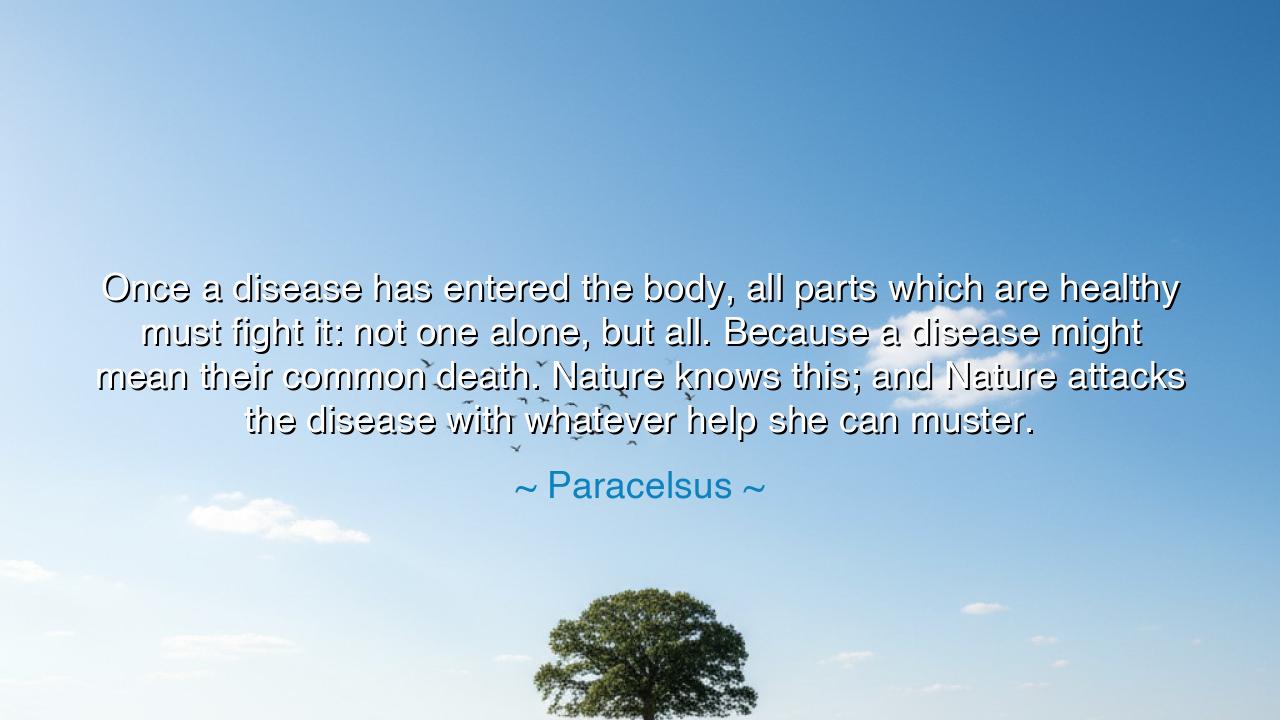
Once a disease has entered the body, all parts which are healthy
Once a disease has entered the body, all parts which are healthy must fight it: not one alone, but all. Because a disease might mean their common death. Nature knows this; and Nature attacks the disease with whatever help she can muster.






In the profound and fiery words of Paracelsus, the healer and philosopher of the Renaissance, we are given not merely a lesson in medicine, but a revelation of life itself: “Once a disease has entered the body, all parts which are healthy must fight it: not one alone, but all. Because a disease might mean their common death. Nature knows this; and Nature attacks the disease with whatever help she can muster.” In these words, we hear not only the wisdom of a physician, but the heartbeat of the universe—the law of unity, the harmony of survival, the truth that life itself is a covenant of cooperation. Paracelsus speaks here of bodies, but his insight stretches far beyond flesh; it reaches into the soul of nations, communities, and the human spirit.
Paracelsus, born Philippus Aureolus Theophrastus Bombastus von Hohenheim, was no ordinary man of medicine. He lived in the sixteenth century, a time when superstition often outweighed science, and dared to proclaim that Nature itself was the great physician. He believed that the body was not a collection of isolated parts, but a living whole—a symphony where each note supported the others. In his time, doctors often treated symptoms in isolation, but Paracelsus saw deeper: he understood that health is harmony, and that when disease arises, it must be faced not by one organ or limb alone, but by the total unity of life. Thus, he wrote not as a mere doctor, but as a prophet of wholeness, revealing a principle that governs both the body and the world—the strength of solidarity.
When he declares that “Nature attacks the disease with whatever help she can muster,” he is describing not only the immune system, but the very law of existence: that life protects life. The blood rushes to heal a wound; the cells rally to defeat infection; even the fever that weakens us for a time is part of Nature’s greater war for survival. Paracelsus saw that the body is not a passive vessel—it is a kingdom that fights for its own continuance, drawing upon every resource to preserve its wholeness. So too should humanity behave when disease, corruption, or evil enters its midst. Just as the body must act as one, so must society, families, and nations unite in the face of that which threatens their shared life.
History gives us living mirrors of this truth. In the dark year of 1347, the Black Death swept across Europe, taking millions of lives. In that time of terror, when ignorance and fear reigned, some communities collapsed, but others endured—those who understood that survival required cooperation. In the Italian city of Siena, doctors, monks, and common laborers worked side by side, burying the dead, caring for the sick, cleansing the streets. Though many perished, their unity became their salvation; through their collective courage, humanity endured. It was Nature’s lesson written in blood and fire: that the only cure for despair is solidarity, and the only antidote to death is the shared will to live.
Paracelsus’s wisdom extends also to the life of the soul. For sin, despair, and hatred are diseases of the spirit, and the healthy parts of the heart must rise against them lest they consume the whole being. When bitterness enters a man’s mind, kindness must rally. When doubt creeps into faith, courage must speak. For just as the body unites to drive out infection, so too must the virtues of the soul join in resistance to darkness. He who allows one part of himself to wither invites the decay of all. The battle for wholeness is fought both in flesh and in spirit, and victory belongs to those who understand that every part of the self must defend every other.
Yet there is another layer still—a moral and societal truth. Humanity itself is one vast body, and when a sickness—be it war, injustice, or hatred—enters the world, it must be resisted by all who remain healthy in conscience. The indifferent heart, the silent witness, the passive bystander—these are like organs that refuse to fight, and by their silence, the whole body perishes. Nature teaches us that apathy is death. When disease strikes the world, each soul must become part of the cure, offering whatever strength, wisdom, or compassion it possesses. This is the eternal law Paracelsus saw in the veins of mankind: that healing is communal, and the strength of one is meaningless without the devotion of all.
The lesson, then, is this: do not stand idle when corruption or suffering appears, whether in your body, your home, or your world. Recognize that your well-being is bound to the well-being of others. When a friend falters, help him rise; when a community suffers, lend your strength. When darkness enters your own heart, call upon every light within you to drive it out. This is the way of Nature, and Nature is the hand of God.
So remember, O children of dust and spirit: the body is one, as is humanity. The disease of one is the danger of all. Let every healthy part—every act of kindness, every word of truth, every gesture of love—rise against that which would destroy life. For as Paracelsus taught, Nature herself fights for her own, and when the parts unite as one, there is no sickness, no evil, no darkness that can overcome the living power of wholeness.






AAdministratorAdministrator
Welcome, honored guests. Please leave a comment, we will respond soon